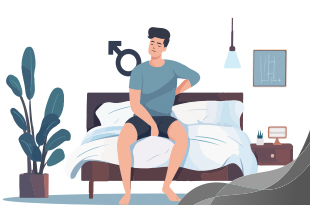The Ultimate Guide to Men’s Health Awareness: Tips, Risks & Prevention
Society nowadays pays considerable attention to women’s health while men’s health is neglected. Much has been done in recent years to draw focus to men’s particular health concerns such as male cancer or heart attacks that are twenty-five percent more likely than women, but many men will avoid visiting a doctor. Such behavior combined with unhealthy lifestyles and social pressure causes men to suffer from more preventable diseases and hence have a relatively shorter lifespan than women. November is considered Men’s Health Awareness Month as it brings a light of hope for affected men every year to seriously start thinking about their health.
This blog will look at the aspects of men’s health, possible issues that can arise, and what the man can do for him to live a better life.
Why Men’s Health Matters?
To begin, there are many shocking facts associated with men’s health. Men die five years earlier than women and, contrary to some social attitudes and stereotyping, many of the diseases that are harmful to male lives could be stopped. There is heart disease, cancer, unintentional injuries, and chronic lower respiratory diseases among the major threats. Also, men are more prone to risky activities such as smoking, excessive drinking and not going for check-ups.
Another pivotal aspect is mental health. Men are successfully taught to hide and deny their emotions since their childhood, which is why they often never seek help and remain undiagnosed for conditions such as depression or anxiety. Unfortunately, men are three and a half times more likely to die by suicide than women.
It is therefore important to increase awareness of these facts as a way of enabling men to manage their health better.
READ MORE: What Is Men’s Health: Key Aspects And Wellness Tips
Key Health Concerns for Men
Cardiovascular Disease:
CVD remains the number one killer of men globally. Other conditions such as hypertension, increased blood cholesterol level, smoking, increased body weight, and physical inactivity are also considered to be some of the risk factors. For instance, most male patients are ignorant especially in the early signs of heart disease including chest pain, short breath, or fatigue.

Prevention Tips:
- Aerobic activity (moderate intensity for 30 minutes a day, at least 5 days per week).
- A diet low in fats, specifically saturated fats, balanced diet with enough portions of fruits, vegetables, lean meats, and whole grain foods.
- Routine checkups of blood pressure, cholesterol, and diabetes.
- Reducing cigarette smoking and avoiding the utilization of alcohol.
Prostate Cancer:
Prostate cancer remains the most widespread type of cancer in men after skin cancer. Though it is not life-threatening and typically progresses slowly, timely diagnosis is very important if proper management is to be implemented. The American Cancer Society routinely advises men older than 50 years about the possibility of screening, and those with a family history of prostate cancer must seek advice from a doctor.
Prevention Tips:
- Prostate-specific antigen tests for all men not less than fifty years of age.
- Maintaining a healthy weight.
- Take foods rich in fruits, vegetables, and antioxidants, and avoid foods that contain too much cholesterol, saturated fats, salt, and sugar.
Mental Health:
Men’s health is generally a very neglected aspect of health, especially regarding their mental well-being. Men suffer from mental disorders and the shame that comes to them from seeking medical assistance. Everyone wants to avoid mental health illnesses such as depression, anxiety, and suicide, though male typically looks for unhealthy ways of handling such conditions by drinking or taking drugs and staying alone.
Prevention Tips:
- Application of effective communication while experiencing mental health problems with friends, relatives, or a physician.
- Admitting to receiving therapy or counseling help when feeling stressed or pressured.
- Exercise helps to improve mood and decrease stress levels.
Testicular Cancer:
Testicular cancer is categorized as a disease typical in youth, it is observed in 15-35-year-old men. Testicular cancer is not as common as many other forms of the disease, but like most cancers, if it is diagnosed and treated in its early stages, it can be prevented. Any man should practice self-check to identify any changes for early detection.
Prevention Tips:
- For any changes, lumps, discoloration, or even experiencing pain, the exam entails monthly self-examinations.
- Get yourself checked up by a doctor frequently if there is a family history of this illness.
Diabetes:
Type 2 diabetes is more common among men if he is aged or overweight. When this disease is not well controlled it results in heart problems, kidney issues, and nerve problems.
Prevention Tips:
- Exercise to control blood glucose levels.
- Regular exercise, avoiding processed foods that contain high amounts of refined sugars, and increased fiber in one’s diet.
- Annual or more frequent check-ups, especially for males aged 45 and older or those with factors that may include high BMI and/or a history of diabetes in the family.
Reducing The Barriers To Mental Health:
Several factors in society and culture explain why males often neglect their mental health and do not attain any health advice for men. Stereotypes of masculinity may encourage male individuals from seeking the necessary assistance believing that it is humiliating to seek help when you are mentally down. This reluctance can have very serious effects in the long run on a male’s mental health.
READ MORE: Men’s Health and Wellness At Any Age
Ways To Overcome These Barriers
Changing the Narrative:
The target for men is to come to know that managing their health is not a matter of weakness but strength. Discussions about male health or wellness, in general, can help reduce this stigmatization.
Regular Screenings:
Males should go for check-ups or tests, especially for ailments such as hypertension, high cholesterol, diabetes, or cancer. Early detection is very important when it comes to mental health.
Incorporating Healthy Habits:
Small modifications to daily behavior, such as decreasing alcohol intake, stopping smoking, and improving diet, all help. Other aspects of nutrition and men’s health include exercise as well as effective stress-busting methods which are part of one’s lifestyle requirements for the longer term.
The Role Of Awareness Campaigns
These are incredibly important for community awareness and elimination of prejudice, such as Men’s Health Awareness Month or the ‘Movember’ event. These campaigns call upon men to be responsible for their health and consult a physician if necessary. Also, they support research work on diseases such as prostate and testicular cancer, mental health, and suicide.
Key Campaigns to Support:
Movember:
A nonprofit organization founded in Australia that is used during November for men to increase awareness of male cancers, in particular prostate and testicular, as well as men’s overall health emphasizing mental health through growing mustaches.
Men’s Health Week:
This week is annually held in June and seeks to increase preventable health issues among men and encourage early detection and treatment of diseases.
Effective Tips To Maintain Men’s Health
Here are some practical tips for men to maintain their health year-round:
Stay Active:
Experts recommend that adults engage in 30 or more minutes of moderate-intensity activities at least five days a week. It assists in improving weight and reducing fats, enhances the quality of blood circulation, and improves the state of mind.
Eat a Balanced Diet:
A healthy body strongly emphasizes the most healthy stuff among composite foods inclusive of fresh fruits and vegetables, meats, and whole grain-based food products. Restrict the consumption of white bread, soft drinks, candy, cookies, snack cakes, pies, potato chips, and fatty meats.
Get Regular Screenings:
Men’s health and nutrition have a strong link. Daily check nutritional health status and high blood pressure, cholesterol, Diabetes, and cancers (Prostate & testicle cancers, etc).
Manage Stress:
Once again, exercise stress-relievers like meditation, deep breathing exercises, yoga, or going out for a walk. Stress is one ailment that can cause so many problems to a person’s health, from internal system problems like heart to mental illnesses.
Prioritize Mental Health:
There is no shame in discussing the negative experiences with one’s mind or turning to a specialist. Besides, relationships and hobbies also contribute to the improved level of mental health.
READ MORE: Male Genital Diseases: Everything to Know
Concluding Remarks!
Most of the time men’s health appears to be not a priority and thus more diseases that could be prevented affect them and their life span is shorter than that of women. Therefore, it is essential to educate people on fundamental aspects of their health including heart health, men’s health prostate health, mental health, and diabetes. Screening reviews, healthy living, and avoiding embarrassment about psychological troubles hopefully will let men live longer. One of the most essential aspects of male-oriented campaigns is Movember and Men’s Health Week which help raise awareness of this issue and encourage men to take charge of their health. Additionally, an effective treatment namely Testosterone Replacement Therapy is also used to treat men. If you know a man in your circle who is reluctant to share their concerns with anyone, then don’t hesitate to share with them the Revive Men’s Health platform and help them regain their mental stability.



